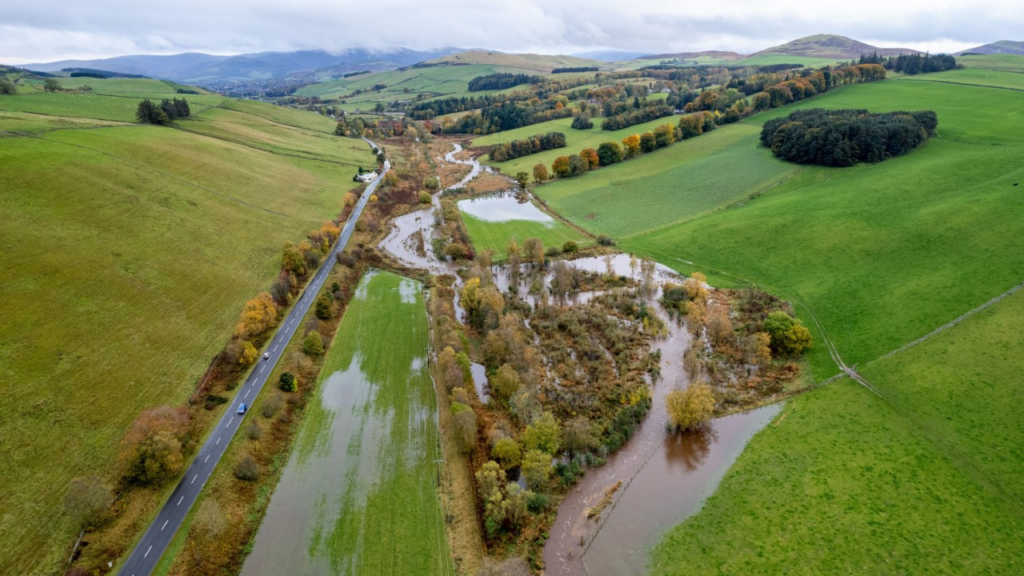DUNDEE university’s’ expertise have contributed to a Scottish project being identified by UNESCO as a global exemplar of environmental management.
The Eddleston Water Project is a living laboratory collecting evidence of the benefits of natural flood management techniques.
Developed by environmental charity Tweed Forum at Eddleston Water in the Scottish Borders, the project has gained global significance by being chosen as a UNESCO Ecohydrology Demonstration Site – the only one in the UK.

The techniques deployed at Eddleston aim to enhance flood resilience through the restoration of natural processes that slow water flows and increase the amount of water stored in the landscape.
This will help reduce the risk of flooding to communities downstream, providing adaptation to climate change, while simultaneously also improving the biodiversity of the river catchment.
Professor Chris Spray, from the UNESCO Centre for Water Law, Policy and Science at Dundee, said, “The full results of the Eddleston Water project will take many years to deliver, but the benefits measured to date are already very exciting, from flood risk reduction to increased plant and wildlife biodiversity.
“This UNESCO recognition is testament to the quality of the scientific methodology being deployed by our team at the University of Dundee and we’re looking forward to sharing the studies we and our partners are conducting here in Scotland with communities across the globe.”
The project is in its 13th year of operation and will now be included as a Demonstration Site in the UNESCO Intergovernmental Hydrological Programme (IHP), part of the intergovernmental UN system dedicated to water research and management.
Measures implemented across the 69km2 Eddleston Water catchment include the creation of 38 new ponds to catch surface water flow and hold water back, and the remeandering of some 3.5km of once-straightened river channels.
Over 100 engineered log structures have been created on streams in the upper catchment. Built to allow fish to pass underneath, these slow excess water by directing it into land on either side of the river channel.
Over 330,000 native trees have also been planted across the catchment. As well as having a positive impact on ecology and sequestering carbon, in time these will also aid water infiltration in upstream areas where floods are generated and will help to slow overland water flows.
Results to date have shown reduced peak water levels downstream during heavy rain as well as a delay of up to seven hours in the timing of river peaks, which gives people more time to prepare and take action.
There has also been a rise in fish numbers due to increasing the channel length through remeandering, and a recovery in the diversity and numbers of aquatic invertebrates in response to the range of new habitats created within these channels.
Other species including Kingfishers, Dippers, Lampreys and Otters will also benefit from improvements to these river habitats.
Luke Comins, Director of Tweed Forum, said, “Climate change is increasing the frequency of extreme weather events such as flooding and our Eddleston Water Project has already attracted international attention as scientists and policy makers try to understand how they can future proof the landscape to be more resilient.
“We’re delighted that this UNESCO recognition will enable us to continue to share the effectiveness of the nature-based solutions we’re implementing on a catchment scale both here and abroad.”
The project is funded by the Scottish Government, EU Interreg and the Scottish Environment Protection Agency and was delivered in collaboration with the University, British Geological Services, local farmers and the surrounding community.
Mairi McAllan, Scottish Government Minister for Environment and Land Reform, added, “I am delighted that the Eddleston Natural Flood Management project, which is supported by the Scottish Government, has been recognised by UNESCO and is now included as a demonstration site in the UNESCO Intergovernmental Hydrological Programme.
“This work shows the importance of natural flood management in reducing the risk from flooding downstream, as well as creating better habitats for many species. The UNESCO designation is a great opportunity for others, both in Scotland and internationally, to learn from the project.
“I would like to thank the team and the local community for the commitment they have shown in taking this forward.”
This is the second time that Tweed Forum’s work has been recognised by UNESCO. In 2009, the charity’s Catchment Management Planning initiative, which aims to protect, enhance and restore the total river environment, was recognised for its standard-setting work by the UNESCO HELP river basin management programme, of which Tweed Forum is now a member.

